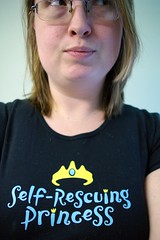
My girlfriend [not pictured] has this T-shirt and I wish I had seen it first so I could have it. I love the message it proclaims, that I do not need rescuing, even if I am a princess, I’m managing quite well thank you.
(I had written this entire post in my head while walking around at lunchtime – when I get to sit down at a PC to write it, some 9 hours later, it’s not all there, so apologies if this makes less sense than I intend.)
You see, I don’t want to be rescued. I’m quite happy doing my thing, enjoying my life and learning as I go. I don’t need to be saved from [insert thing here] by someone who believes that I do – because that just denies my agency, my choice, my experience and my desires.
Far too often people act on their opinions about other people’s behaviour/appearance/beliefs/actions stating what someone “should” do, concern trolling or intervening directly in whatever they see is an issue. There is a difference between asking if someone is ok and dictating a solution (which is most likely unwanted), or directly intervening in something which the observer considers an issue, but the individual concerned does not.
s.e. smith writes in ou’s amazing blog a post about cure evangelism which is also relevant:
When you have been exposed to a culture which regards you as a publicly tradeable commodity, exercising control and autonomy become especially paramount. Being able to make decisions for yourself and your own body without the approval or consent of others is part of taking control of yourself and your identity. Thus, when people in these groups are informed that they must do something, it comes from a very entrenched culture of ownership. The person speaking often has privilege, and is exercising that privilege thoughtlessly. Many people claim to be well meaning, say that they just want people to be informed, but this presupposes that people are not informed on their own and that, moreover, it is only possible to reach one informed choice.
Having things you “should” do sets you up for failure, because by the time you get around to “I should have…” you haven’t… and you therefore have permission to guilt trip yourself, or beat yourself up, or what ever works best… and that stems from our overly prescriptive society I believe. You “should” have done your homework before Sunday afternoon, you “should” have known not to get into a relationship with that individual, you “should” not have eaten that slice of cake, you “should” have gone to bed early, etc.
When we were children we, well I did, had parents who got to decide things for us. They decided what we “should” do, what schools we went to, whether we believed in a god/s, what communities we were involved with, etc. As adults we were supposed to gain our independence and be able to make our own decisions about continued study, work, health, socialising, community involvement, etc. However, parents, friends, family and random strangers often decide to intervene in our decisions and tell us what we should and should not do, even though we’d rather they not. And like s.e. smith’s comment above, the denial of agency comes from a very entrenched culture of ownership.
So next time, before you go riding in to rescue or save someone, find out if they want it. Next time, before you tell someone what they should do, consider how you feel when you are told what to do by someone else. Next time, before you pass judgement on someone, think about how that will make them feel.
This does not stop you having opinions about things, because that is close to impossible, but try and think about your opinions and how healthy they are for you and those around you. I can think all I like about how I believe that X should never have entered a relationship with Y, or how some of Z’s problems would be solved if ou got a new job. But for me to tell them that, that’s hardly fair or reasonable. It does not take into account elements of their situation that I cannot know, it tells them that I believe that my opinion of their situation is more important than their own (otherwise why would I dictate something to someone?) and that I believe that I am superior to them (otherwise I would not be dictating to them). Of course, since I’m referring to adults and not children, none of this is true – and is rarely true for most children either. Again, to tell someone what they should do demonstrates that I do not trust their own judgement and ability to decide on a course of action.
I do not need saving, I do not need a knight in dented and rusty armour, I do not need to be told how to improve myself. I will ask for help if I need it and otherwise will continue along my own way, learning, having fun and doing it my way.
